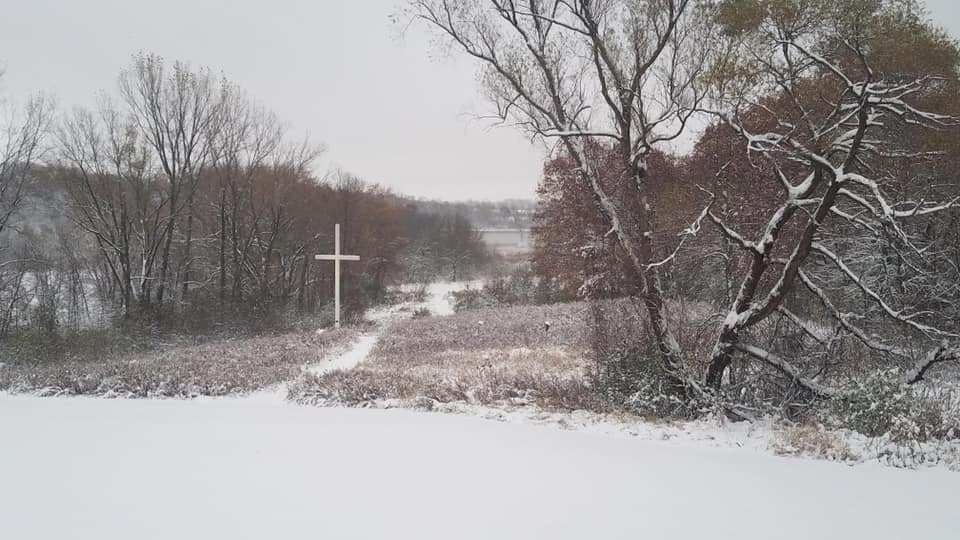
I woke up early Tuesday morning to rake as many fallen leaves as possible. My race to beat the snow was motivated by a strong distaste of both shoveling leafy-snowy mixtures now and raking wet, rotting leaves later. I hauled my sixth bag into the garage twenty minutes after the snow began in earnest. I poured myself a hot drink and began my other work for the day. Retreat center staff were about to embark on early snow removal. I pondered the stark contrast of that moment with a few days before when a brilliant canopy of colored leaves covered our 153 acres.

Photo by Peter Stratmoen

A mid-October snow in the midst of a pandemic is not what anyone that I know (with the exception of the kids in my house and neighborhood) welcomes, yet here it was upon us. Just like the rest of 2020. Surprisingly I was more happy than grumpy even when my day ended with back-wrenching shoveling, and a good old-fashioned snowball fight with the kids. As the flakes descended, old wintry feelings arose: the desire to hunker down in my home, turn on the gas fireplace, drink a mocha, and curl up on my couch with a good book; the longing to slow down and listen to myself, to God, and to wise friends.
Throughout the past seven months, the wisest voices – at least in my estimation – have asked us collectively in one way or another, “What is the invitation to us as human beings living through a pandemic? What life-sustaining changes might we embrace now? What life-denying, earth-destroying practices can we abandon now?” These voices have called us to a season of reflection, asking us, “Can you see that the way you’ve been living is not sustainable? Is not as good as you think? Is profoundly destructive for those who are most vulnerable and pressed to the margins?”
Professor Travis West, who wrote two posts for us recently, reminds us that Sabbath rest entails reflection of this sort. As we slow down, we take stock of our lives and how we inhabit the world. We need regular recalibration in order to participate in that which is beautiful, good, and true. Thus the Sabbath, as he puts it, disrupts us. It shakes us out of our normal patterns and practices for the sake of flourishing—and not just our own personal flourishing but the flourishing of ALL.
It seems to me that sometimes creation itself conspires with God in calling us into this kind of disruptive and reflective rest. Take, for instance, snow. It slows us down and quiets us. Snowflakes absorb sound, and the stillness of falling flakes elicits outer and inner quiet. A hush comes over us, punctuated by the periodic crunch of tires on the road outside. The short poem, Silence, Falling Snow by Tracy Adair, captures our experience:
Silence, falling snow
Surprised by the light of the moon
Quiet accumulates
Snow in mid-October—even in Minnesota—might also disquiet us as winter looms and COVID-19 cases surge. We’ve been anticipating increased solitude and loneliness along with another round of holiday connections mediated through Zoom. How will those who suffer the effects of mental illness fare in the upcoming months? How will all of us play our part in caring for them, as well as for ourselves? These, too, are important questions for prayerful reflection.
Prior to last Tuesday, I had been squeezing in as many socially-distant outdoor visits with friends as possible. I recognize that I don’t quite qualify as a hearty-Minnesotan – no ice fishing for me! – but even my snow-loving friends acknowledge that in-person encounters are going to decrease significantly, or if not, contribute to more illness and death for those most vulnerable. How do we manage the disquiet (the understandable worry and anxiety) of these days?
Perhaps, in part, the answer lies in placing our attention on the quietness of the snow. Which, when understood in light of the Sabbath, reminds us to rest from work, to set aside our to-do lists, to slow down our pace, to remember the promises of God and the love of God. Perhaps we will discover joy piercing the weight of worry and sadness if we heed some of Travis’ advice and more: to practice delight, to cover up our clocks, to journal, to dwell on good poetry, to sing hymns and memorize psalms, to walk mindfully through our neighborhoods or even Mount Olivet Conference & Retreat Center. In short, perhaps this mid-October snow is an invitation to retreat where we are for the sake of holy disruption.
*Theresa F. Latini, Ph.D. is the Executive Director of Mount Olivet Conference & Retreat Center and an ordained minister in the Presbyterian Church (USA)
Beautiful reflection. ❤️
Diana
Sent from my iPhone
>
Thanks so much, Diana!
A beautiful invitation, Theresa, to open our hearts to the holy disruptions seeking to reorient us toward a more fruitful and wholehearted way of inhabiting our own lives. I love the posture you demonstrate here, asking the snowfall (and our response to it), what it is inviting us to consider—about our lives and our living. Shalom.
Travis
Thanks for noticing the invitation and, as always, your connection of all this to “shalom,” Travis.